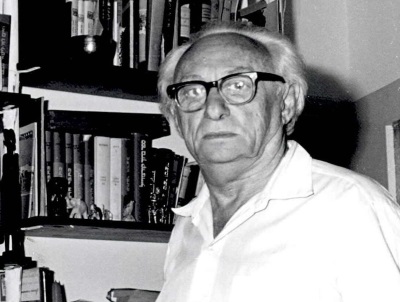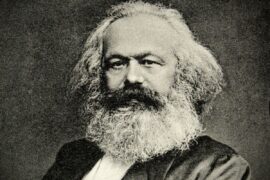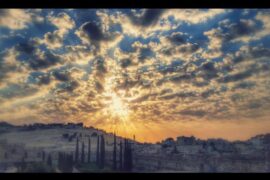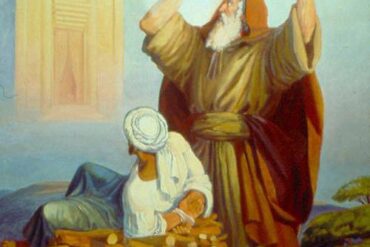In The First Tithe, a rarely studied pivotal work by Dr. Israel Eldad on his time as ideological leader of the Fighters for the Freedom of Israel (Leḥi), the author offers the following analogy:
“Tel Aviv is to the land of Israel as lipstick is to a woman’s lips. Pleasant for quick glance, but not for a close kiss. There is nothing here to get close to, no force to hug and no depth. When in her later years my mother began applying lipstick, I commented that the lipstick was not adding to her beauty: ‘Your white hair is your crown.’”
The book describes in depth not only Eldad’s work to free the land of Israel from British rule but also his own understanding of that anti-colonial struggle, his personal participation in it, and the larger events taking place around him during that period.
Following the assassination of Yair (Avraham Stern) by British detectives in Tel Aviv, Eldad became one of the three members of the Leḥi “center” that took upon itself the responsibility to rebuild an urban guerrilla movement that had been decimated by British suppression. More specifically, Eldad became the ideological leader of the organization, which was known as both the smallest and most ruthlessly violent of the pre-state Jewish militias in Palestine.
Much of The First Tithe analyzes and laments the lack of sociopolitical foresight within the leadership of the Zionist movement during the 1930s and 40s.
Born to a Zionist father and Ḥasidic mother in Galicia, Eldad had spent his youth studying in the Jewish gymnasium of Lodz and then later at the University of Vienna. His broad education covered the German philosophers, TaNaKh, and Hebrew language among other topics.
Initially a follower of Z’ev Jabotinsky and a member of the Betar movement, Eldad formulated his worldview against the backdrop of the violent persecution Jews suffered during the interwar period in Eastern Europe.
Upon encountering the revolutionary poetry of Uri Zvi Greenberg and the liberation-at-all-costs philosophy of Yair Stern, Eldad broke away from Revisionist Zionist thinking and formulated much of what would become the Sternist ideological tendency (read more about Eldad’s biographical information and ideological development here).
Upon the outbreak of World War II, Eldad escaped from Poland and made aliya to Eretz Yisrael. One of his first stops along the way was Tel Aviv, which he was not impressed by as evidenced by the quote at the beginning of this piece. Jerusalem, on the other hand, changed his life as it has for many of us. It is no secret to anyone with a modicum of historical knowledge and spiritual sensitivity that Jerusalem affords a clear lens by which to observe the many problems, triumphs, and aspirations of Jewish history.
Jerusalem perpetually exists in a state of suspended animation somehow retaining its ancient aura against the bustling backdrop of modern life without decaying or fading into irrelevance. In fact, it does just the opposite. It imbues its inhabitants with a sense of profound relevance and inspires us to imagine what a future centered around the city could look like. It draws to the attention of all who walk its narrow alleys that they are walking on the intersection between past, present, and future – between history and destiny.
Jerusalem’s effect on the psyche (and perhaps the soul?) can be so profound that some researchers have coined the loosely defined term “Jerusalem Syndrome” to describe a set of experiences ranging from awe to psychosis upon touring the city. Though “Jerusalem Syndrome” has been largely debunked as its own mental disorder, the city’s power cannot be ignored.
Much like a woman whose physical beauty is somehow augmented by her intellectual, moral, and spiritual qualities; whose physical idiosyncrasies and asymmetries somehow make her more perfect, so is Jerusalem. Every stone that is seemingly out of place, every rusted banister, every nook, and every awkward turn somehow adds to her magnetism and charm.
On the other hand, anyone who has been to Tel Aviv experiences an initial surge of energy. She is the first to greet us as we finish our trip over the Mediterranean Sea from the west. One immediately notices her coastline studded by modern skyscrapers and crowded beaches – the flashy red lipstick of Eretz Yisrael.
As one ventures deeper into the city and strolls down Arlosoroff street, one waits in anticipation, wanting to learn more about the mystery woman donning the lipstick. She is beautiful and impressive to behold, but who is she underneath the makeup? What makes her tick?
This brings us to Luna.
Luna Armoza – of the famed “The Beauty Queen of Jerusalem” Netflix historical fiction series – is from an affluent Sephardic pro-Hagana family in British Mandate Palestine. She quickly develops a passion for fashion, becoming one of the most successful dressmakers in British-occupied Jerusalem. Her maternal uncle, Ephraim Siton, is a member of the Etzel and later Leḥi. He lives the life of an underground fighter donning different disguises and moving from place to place. He occasionally stops to check in with his sister, Rosa (Luna’s mother), who is in a loveless marriage with Gavriel Armoza.
The series opens with Luna and her friend, Matilda, gallivanting around Jerusalem with British soldiers. In order to intimidate Matilda, Ephraim kidnaps her and warns her to stop associating with soldiers of the empire. He (and perhaps the Etzel and Leḥi by extension) is depicted as a cruel and chauvinistic character who can’t accept that “love is love” rather than someone trying to free his people and country from foreign rule. Luna can’t wrap her head around it. When a sober Matilda explains the broader issue to Luna, the latter delights at the idea that her uncle (who everyone hates anyway) could be hanged by one of history’s most brutal colonial powers.
After Ephraim plants a bomb at a British Purim party to take down as many upper echelons of the military as possible, a search party finds and ambushes him at the Armoza home. They threaten to indiscriminately shoot at the Armoza house with everyone inside if Ephraim does not turn himself in, which he proceeds to do. Despite Luna’s coziness with the sergeant, he brings her in for questioning – quickly abandoning the friendly façade he upheld prior to the attack. His true attitude towards Jews begins to show.
One would think that this formative experience at the age of sixteen would teach Luna a clear lesson about the true nature of the conflict and the cost of forever living under foreign rule. But to Luna, it doesn’t register. Her insensitivity to the Jewish people’s reality at that time does not diminish when she is in her twenties by the end of the third season. On several occasions, her employer laments the ongoing Shoah in Europe. Luna’s reaction is often apathetic and, at best, a frown or sigh. At no point does it occur to her that the inhumanity against Jews at the hands of the Nazis stems from the same ideological source as the hostility shown against her uncle and his movement. At no point does she wonder whether she should help take action to stop the injustices in whatever way she can.
Luna embodies the passivity and shortsightedness that has defined the bourgeois Jewish leadership for a long time. One could more readily forgive these traits in a teenager or even the leader of a young country if they did not stem from that same rotten root: self-interest. Though a common human flaw, acting in pure self-interest is a luxury the Jews cannot afford in individual form. Historically, the consequences of doing so have resulted in efforts to kidnap Jewish freedom fighters at the behest of the empire or to fire at the Altalena.
At so critical a moment in Israel’s history, when weapons were desperately needed to defend the nascent State of Israel, Etzel commander Menaḥem Begin sailed arms to the country’s shore on the Altalena. When Prime Minister David Ben-Gurion ordered the Palmaḥ to sink the ship, Begin refused to return fire so as to avert a civil war.
Bewildered that a Jew could give such an order, Eldad concluded that “preservation of the existing regime” took priority over every other consideration in those days. In other words, ensuring that the Labor Zionist institutions remain in power was the primary function of Ben-Gurion’s security forces.
“Do not belittle budgets,” he recounts Hagana Chief of Staff Israel Galili telling him. The remnant effects of this moral corruption can be seen in the streets of Tel Aviv today.
Those who clog highways today in attempts to hold the state hostage belong to the same class Eldad describes in The First Tithe. Threatening to withhold medical and military services, harassing Torah-observant Jews in the streets, and leveraging the economic might of multimillion dollar industries as political ransom all stem from the same naked self-interest that destroyed the city of S’dom.
As our sages that us that “One who says, ‘What is mine is mine, and what is yours is yours’ this is a median characteristic—others say that this is the character of a Sodomite.” (Pirkei Avot 5:10)
In other words, when one is thinking only of themselves and their narrow ends, they display a shamelessness too repulsive for even Tel Aviv lipstick to repair.
It is time we recognize that each camp in Israeli society, the Jewish world, and indeed all of humanity has what to contribute to the collective whole. Unlike any other group or revolutionary movement, Leḥi embodied this ethos, uniting communists, nationalists, Ḥaredim, and even some Arabs under the same banner. Though small, this banner existed, nonetheless.
Citing a teaching about Noaḥ’s ark from HaRav Avraham Yitzḥak HaKohen Kook, Eldad explains this phenomenon as follows: “Of course economic factors exist, deep sexual desires exist, man bears within him some characteristics of the ape, but the Vision, the idea, must rule within man, provide for his needs as Noaḥ provided for the needs of every living creature on the ark and, if not, the lion will ravage him, the dark forces will rule.”
“But” he concludes, “if Noaḥ the righteous, the Vision, the idea, rules firmly, then the ark will sail through any flood and rainbows of splendor will appear, and the dove of peace.” (The First Tithe, pp. 383)





